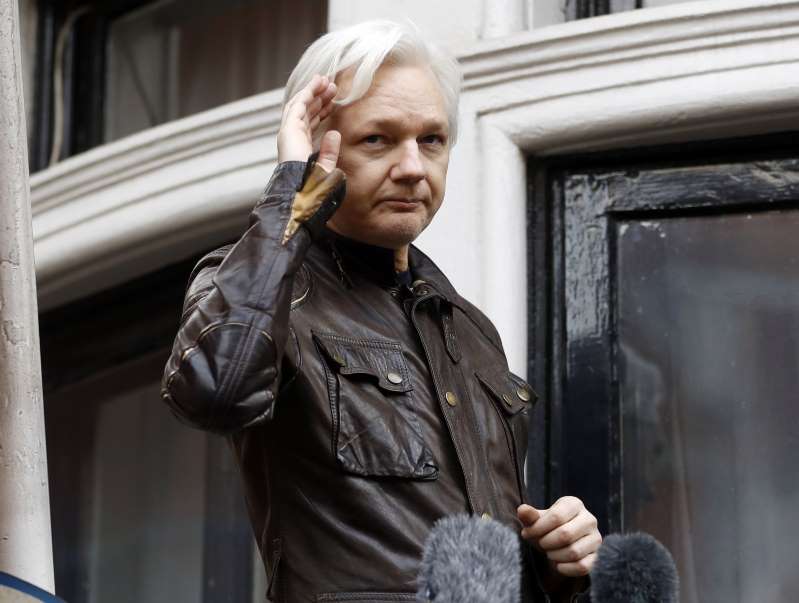By James McAuley, Ellen Nakashima, Anthony Faiola, Wasahington Post–
Ecuador handed Julian Assange over to British authorities Thursday, ending a standoff that left the controversial WikiLeaks founder holed up in the Ecuadoran embassy in London for nearly seven years.
Ecuador, which took Assange in when he was facing a Swedish rape investigation in 2012, said it was rescinding asylum beacuse he of his “discourteous and aggressive behavior” and for violating the terms of his asylum.
Sweden dropped its sex crimes inquiry in May 2017 — Assange had always denied the allegations. But he still faces up to a year in prison in Britain for jumping bail in 2012. And, more than anything, he fears extradition to the United States, which has been investigating him for espionage, the publication of sensitive government documents and coordination with Russia.
“Ecuador has decided to terminate the diplomatic asylum granted to Mr. Assange in 2012,” said President Lenin Moreno in a video statement tweeted by the country’s communications department. “The asylum of Mr. Assange is unsustainable and no longer viable.”
Moreno specifically cited Assange’s involvement in WikiLeaks as the meddling in the internal affairs of other countries, referring to the leaking of documents from the Vatican in January.
WikiLeaks has characterized Assange’s expulsion as retribution for its reporting on corruption accusations against Moreno.
“If President Moreno wants to illegally terminate a refugee publisher’s asylum to cover up an offshore corruption scandal, history will not be kind,” WikiLeaks said in a statement.
Ahead of the U.S. election in 2016, WikiLeaks released tens of thousands of emails that had been stolen from the Democratic National Committee and from Hillary Clinton’s campaign chairman, John Podesta, in cyber-hacks that U.S. intelligence officials concluded were orchestrated by the Russian government.
When Special Counsel Robert S. Mueller III indicted 12 Russian military intelligence officers, he charged that they “discussed the release of the stolen documents and the timing of those releases” with WikiLeaks — referred to in the indictment as “Organization 1” — “to heighten their impact on the 2016 presidential election.”
But Assange has been on U.S. prosecutors’ radar screen since 2010, when WikiLeaks’ publication of 250,000 diplomatic cables and hundreds of thousands of military documents from the Iraq War prompted denunciations by then-Secretary of State Hillary Clinton and senior Pentagon officials.
The Army private who had passed the material to WikiLeaks, Chelsea Manning, was tried, convicted and served seven years of a 35-year prison term before having her sentence commuted by President Obama as he left office. She was jailed again last month for refusing to testify before a grand jury investigating Assange.
In the last administration, Attorney General Eric Holder decided against pursuing prosecution of Assange out of concern that WikiLeaks’ argument that it is a journalistic organization would raise thorny First Amendment issues and set an unwelcome precedent.
The Trump administration, however, revisited the question of prosecuting members of WikiLeaks, and last November a court filing error revealed that Assange had been charged under seal.
Conspiracy, theft of government property or violating the Espionage Act are among the possible charges.
Some federal prosecutors say a case can be made that WikiLeaks is not a journalistic organization. As if to lay the groundwork for such an argument, in April 2017, then-CIA Director Mike Pompeo, now secretary of state, characterized WikiLeaks as a “nonstate hostile intelligence service” and a threat to U.S. national security.
Pompeo also noted then that the intelligence community’s report concluding Russia interfered in the 2016 election also found that Russia’s primary propaganda outlet, RT, “has actively collaborated with WikiLeaks.”
Assange’s expulsion from Ecuador’s embassy reflects a shift in the country’s politics since it first extended refuge to him.
The leftist former President Rafael Correa, now living in Belgium, is wanted for arrest in his homeland over alleged links to a 2012 political kidnapping. Correa was viewed as a member of an anti-Washington gaggle of South American leaders, including Venezuela’s Nicolás Maduro and Bolivia’s Evo Morales. He kicked out the U.S. ambassador in 2011.
The more moderate Moreno, in sharp contrast, has sought to mend frayed ties with the United States, Ecuador’s largest trading partner, and has dismissed Assange as “a stone in my shoe.”
In June 2018, Vice President Pence visited Quito, the capital, as part of the most senior U.S. delegation sent to Ecuador in years.
“Our nations had experienced 10 difficult years where our people always felt close but our governments drifted apart,” Pence said. “But over the past year, Mr. President, thanks to your leadership and the actions that you’ve taken have brought us closer together once again. And you have the appreciation of President Trump and the American people.”
Sebastián Hurtado is president of Prófitas, a political consulting firm in Quito.
“I think the president has never been comfortable with Assange in the embassy,” he said. “And it’s not like this is an important issue for most Ecuadorans. To be honest, we really don’t care about Assange.”
The Moreno administration had made no secret of its desire to unload the issue. In December 2017, it granted Ecuadoran citizenship to Australian-born Assange and then petitioned Britain to allow him diplomatic immunity. The British government refused, saying the way to resolve the stalemate was for Assange to “face justice.”
Another hint that Assange was wearing out his welcome came in March 2018, when Ecuador cut off his Internet access, saying he’d breached an agreement not to interfere in the affairs of other states. The embassy didn’t specify what Assange had done, but the move came after he tweeted criticism of Britain’s assessment that Russia was responsible for the poisoning of a Russian former double agent and his daughter in the city of Salisbury.
Ecuador imposed tighter house rules last fall. Among the demands were that Assange pay for his medical and phone bills and clean up after his cat.
karla.adam@washpost.com
ellen.nakashima@washpost.com
Nakashima reported from Washington. Faiola reported from Miami.


Leave A Comment
You must be logged in to post a comment.